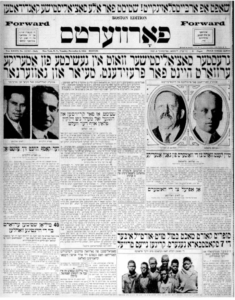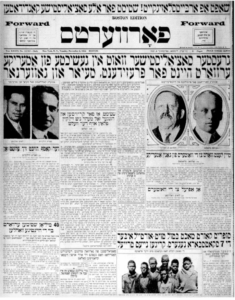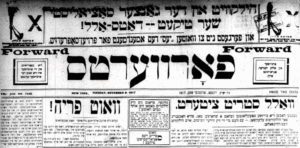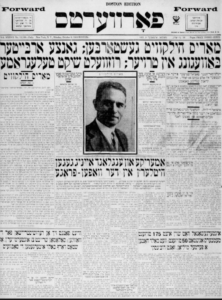Uncategorized
A century before Mamdani, this Jewish socialist mayoral candidate divided NYC Jews

A socialist immigrant running for mayor on an anti-war, pro–working class platform divides New York’s Jews over whether his campaign, and potential victory, might stoke antisemitism.
The year isn’t 2025, and the man isn’t Zohran Mamdani. It’s 1917, and Jewish labor lawyer Morris Hillquit is running on the Socialist Party ticket.
While Hillquit fell well short of winning, he received more than 100,000 votes, or about 22% — over four times the Socialist tally four years earlier. He ran again in 1932, receiving about 12 percent of the vote.
Who was Hillquit, and how did his mayoral moment parallel the political currents shaping Mamdani’s rise today?
The economic parallels
Many aspects of Hillquit’s 1917 and 1932 mayoral platforms bear a striking resemblance to Mamdani’s today, according to Shelton Stromquist, emeritus professor of history at the University of Iowa and author of Claiming the City: A Global History of Workers’ Fight for Municipal Socialism.
Hillquit called for public ownership of the city’s transportation, and for the construction of affordable housing to replace substandard living arrangements. He also promised to bring down food prices, pledging to “put the milk profiteers out of business” by buying milk directly from farmers and selling it at cost.
Mamdani’s campaign has echoed many of those ideas, centering on affordability with proposals to make buses “fast and free,” freeze rents for tenants in rent-stabilized apartments, and create city-owned grocery stores.
And just as Mamdani has positioned his campaign as fighting big-money influence, Hillquit’s campaigns took on a populist tone.
“Too long have the people of New York been misruled for the benefit of bankers, franchise magnates, realty speculators, landlords, and other capitalists,” read a pamphlet distributed by the Socialist Party endorsing Morris Hillquit for mayor in 1932.
Both campaigns also drew on immigrant pride, according to Stromquist. Mamdani was born in Uganda; Hillquit in modern-day Latvia, then part of the Russian Empire, in 1869. Hillquit’s family immigrated to the U.S. in 1896, settling in a Lower East Side tenement. He dropped out of school to help support them, working in garment factories and later helping to start the United Hebrew Trades, a garment workers’ union.
Like Mamdani, “Hillquit’s campaign was singular in many ways, but at the same time, it was very much a part of a broader movement that had been growing and spreading,” Stromquist said.
Mamdani, for his part, cites Vermont Senator Bernie Sanders — a fellow democratic socialist — as an inspiration. Sanders endorsed Mamdani and featured him on his “Fighting Oligarchy” tour, events that often draw tens of thousands of people and highlight other rising democratic socialists, including Alexandria Ocasio-Cortez. A recent poll shows socialism is more appealing to college students than capitalism.
Municipal socialism was also gaining traction in the early 20th century. In 1910, Jewish politician and journalist Victor Berger became the first socialist elected to the U.S. House of Representatives, representing a Milwaukee district. In 1913, socialists won a majority on Hamilton, Ohio’s city council and elected the mayor.
And while Hillquit lost the 1917 mayoral race, socialists still made gains in New York City that year: 10 state assemblymen, seven city aldermen, and one municipal judge were elected on the Socialist Party ticket. Of those 18 elected, 16 were Jewish.



A campaign that divided Jews
Mamdani’s positions on Israel have roiled Jews across the country, and he’s often had to defend himself against allegations of antisemitism for: refusing to outright condemn the slogan “globalize the intifada;” reiterating support for Palestinians in his statement on the Gaza ceasefire; vowing to arrest Israeli Prime Minister Benjamin Netanyahu if he visits New York; and saying he doesn’t recognize Israel as a Jewish state. He’s simultaneously built a coalition of Jews who support him.
During the 1917 mayoral election, opposition to U.S. involvement in World War I overshadowed economic concerns for many voters, according to Stromquist.
Hillquit, a pacifist, was a principal co-author of the Socialist Party’s resolution opposing U.S. entry into World War I, and he made peace a central plank of his campaign.
His stance drew fierce backlash. Opponents labeled him “a traitor and an agent of the Kaiser,” and the attacks quickly grew personal. A 1917 editorial in this publication, the Yiddish Forverts, noted that Hillquit’s “bitterest enemies wish to see him drown in the Rutger Street fountain, or hanged off a sloop on the East Side.”
Hillquit’s position split the Jewish community. Some feared antiwar sentiment would make Jews appear unpatriotic and fuel antisemitism, according to Gil Ribak, associate professor of Judaic Studies at the University of Arizona and author of the paper “For Peace, Not Socialism”: The 1917 Mayoralty Campaign in New York City and Immigrant Jews in a Global Perspective.”
One newspaper editor wrote to his readers as “a Jew to Jews,” asking them if they wanted “to give a chance for our neighbors to say that we are not loyal enough to America?”
Even Supreme Court Justice Louis Brandeis weighed in, telling his colleagues at a private meeting of Zionist leadership in 1917, “I cannot help feeling myself that the pacifistic attitude of some Jews is a danger to all Jews, and some form of a pogrom would not be at all unlikely.”
Others dismissed such concerns as fearmongering and rejected the idea that Jews had to vote a certain way to prevent antisemitism. As Forward founding editor Abraham Cahan argued in this publication, “Well, if we are destined, heaven forbid, to have the antisemitic bear come at us, then let’s not give our vote to a corrupt gang.”
Ultimately, the attacks on Hillquit did not deter Jewish voters. Though he fell well short of winning office, according to Ribak, turnout for Hillquit was especially strong in Jewish neighborhoods with the socialist candidate winning more than 60 percent of the Jewish vote in some areas of the Lower East Side.
Chana Pollack contributed research. Jacob Kornbluh contributed writing.
The post A century before Mamdani, this Jewish socialist mayoral candidate divided NYC Jews appeared first on The Forward.
Uncategorized
Tucker’s Ideas About Jews Come from Darkest Corners of the Internet, Says Huckabee After Combative Interview

US Ambassador to Israel Mike Huckabee looks on during the day he visits the Western Wall, Judaism’s holiest prayer site, in Jerusalem’s Old City, April 18, 2025. Photo: REUTERS/Ronen Zvulun
i24 News – In a combative interview with US Ambassador to Israel Mike Huckabee, right-wing firebrand Tucker Carlson made a host of contentious and often demonstrably false claims that quickly went viral online. Huckabee, who repeatedly challenged the former Fox News star during the interview, subsequently made a long post on X, identifying a pattern of bad-faith arguments, distortions and conspiracies in Carlson’s rhetorical style.
Huckabee pointed out his words were not accorded by Carlson the same degree of attention and curiosity the anchor evinced toward such unsavory characters as “the little Nazi sympathizer Nick Fuentes or the guy who thought Hitler was the good guy and Churchill the bad guy.”
“What I wasn’t anticipating was a lengthy series of questions where he seemed to be insinuating that the Jews of today aren’t really same people as the Jews of the Bible,” Huckabee wrote, adding that Tucker’s obsession with conspiracies regarding the provenance of Ashkenazi Jews obscured the fact that most Israeli Jews were refugees from the Arab and Muslim world.
The idea that Ashkenazi Jews are an Asiatic tribe who invented a false ancestry “gained traction in the 80’s and 90’s with David Duke and other Klansmen and neo-Nazis,” Huckabee wrote. “It has really caught fire in recent years on the Internet and social media, mostly from some of the most overt antisemites and Jew haters you can find.”
Carlson branded Israel “probably the most violent country on earth” and cited the false claim that Israel President Isaac Herzog had visited the infamous island of the late, disgraced sex offender Jeffrey Epstein.
“The current president of Israel, whom I know you know, apparently was at ‘pedo island.’ That’s what it says,” Carlson said, citing a debunked claim made by The Times reporter Gabrielle Weiniger. “Still-living, high-level Israeli officials are directly implicated in Epstein’s life, if not his crimes, so I think you’d be following this.”
Another misleading claim made by Carlson was that there were more Christians in Qatar than in Israel.
Uncategorized
Pezeshkian Says Iran Will Not Bow to Pressure Amid US Nuclear Talks

Iranian President Masoud Pezeshkian attends the Shanghai Cooperation Organisation (SCO) Summit 2025, in Tianjin, China, September 1, 2025. Iran’s Presidential website/WANA (West Asia News Agency)/Handout via REUTERS
Iranian President Masoud Pezeshkian said on Saturday that his country would not bow its head to pressure from world powers amid nuclear talks with the United States.
“World powers are lining up to force us to bow our heads… but we will not bow our heads despite all the problems that they are creating for us,” Pezeshkian said in a speech carried live by state TV.
Uncategorized
Italy’s RAI Apologizes after Latest Gaffe Targets Israeli Bobsleigh Team

Milano Cortina 2026 Olympics – Bobsleigh – 4-man Heat 1 – Cortina Sliding Centre, Cortina d’Ampezzo, Italy – February 21, 2026. Adam Edelman of Israel, Menachem Chen of Israel, Uri Zisman of Israel, Omer Katz of Israel in action during Heat 1. Photo: REUTERS/Athit Perawongmetha
Italy’s state broadcaster RAI was forced to apologize to the Jewish community on Saturday after an off‑air remark advising its producers to “avoid” the Israeli crew was broadcast before coverage of the Four-Man bobsleigh event at the Winter Olympics.
The head of RAI’s sports division had already resigned earlier in the week after his error-ridden commentary at the Milano Cortina 2026 opening ceremony two weeks ago triggered a revolt among its journalists.
On Saturday, viewers heard “Let’s avoid crew number 21, which is the Israeli one” and then “no, because …” before the sound was cut off.
RAI CEO Giampaolo Rossi said the incident represented a “serious” breach of the principles of impartiality, respect and inclusion that should guide the public broadcaster.
He added that RAI had opened an internal inquiry to swiftly determine any responsibility and any potential disciplinary procedures.
In a separate statement RAI’s board of directors condemned the remark as “unacceptable.”
The board apologized to the Jewish community, the athletes involved and all viewers who felt offended.
RAI is the country’s largest media organization and operates national television, radio and digital news services.
The union representing RAI journalists, Usigrai, had said Paolo Petrecca’s opening ceremony commentary had dealt “a serious blow” to the company’s credibility.
His missteps included misidentifying venues and public figures, and making comments about national teams that were widely criticized.


